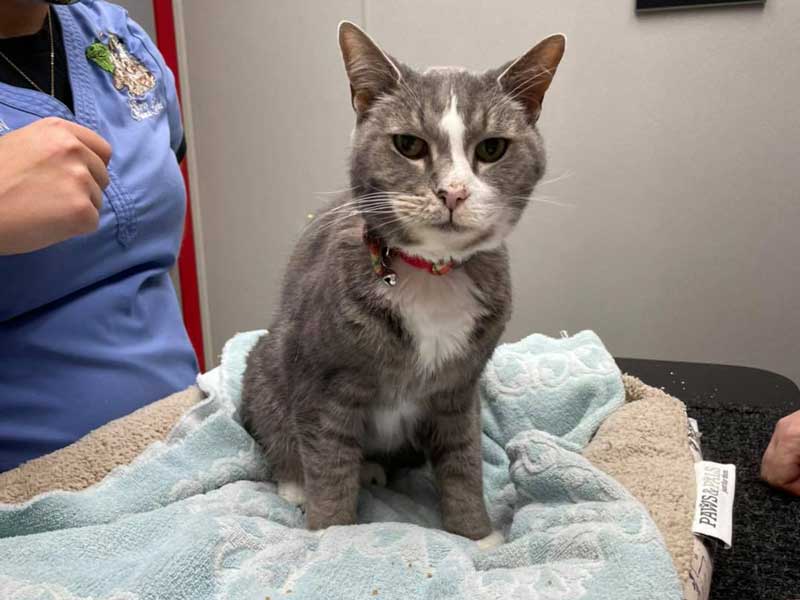Geriatric Cats
Possible Geriatric Syndromes
Chronic Weight Loss - Weight loss is very common in our geriatric population. The problem is that weight loss can stem from a variety of ailments or underlying diseases. Two interesting causes of chronic weight loss in cats are Diabetes and Hyperthyroidism. With these two diseases, the cat's appetite is initially either good or great! Despite the good appetite, and perhaps eating more than normal, there is persistent weight loss. Both of these diseases are treatable. A good history needs to be examined to see if we have vomiting or diarrhea as part of the problem. Or, is a lack of appetite the primary concern? If the weight loss is due to cancer, kidney disease, liver disease, or heart disease, then those specific diseases need to be treated. If no specific diseases can be found, then appetite stimulants may be appropriate.
Continuous Poor Appetite - As mentioned above under chronic weight loss, poor appetite is usually due to an underlying disease. The most common are kidney or liver disease. Additionally, heart disease and certain forms of cancer could result in poor appetite as the only obvious sign of illness. It is important to do adequate testing to investigate the true cause.
Decreased Mobility - Decreased mobility could be due to a problem in a specific leg, multiple areas of arthritis, or a neurological condition. We frequently look at our older dogs and say that they are sleeping more and laying around more due to "age", but in reality, it is usually pain or instability that causes our pets to just lay around.
Chronic Pain - We all have aches and pains from time to time, but when a cat has chronic pain it can be debilitating. That pain usually affects appetite, mobility, and general attitude. Some cats seem to get grumpy with age. This personality change is probably due to pain coming from somewhere in the body. Sometimes the source of the pain is obvious, but frequently it will take a search by your veterinarian to locate the painful area of the body.
Chronic Vomiting - Many people seem to think that vomiting is pretty normal in cats. In reality, any vomiting should be considered a potential sign of an illness. If vomiting is also associated with weight loss, then prompt attention is appropriate. When vomiting becomes more frequent, we need to go hunting for the cause. Typical causes in our older patients would include blockages caused by a growth in the stomach or intestines, chronic liver or kidney disease, drugs that are irritating the stomach, intolerance to food, or hyperthyroidism.
Unaware of Surroundings - No one wants to think about it, but senility does occur in cats. The signs of senility can include the following: not recognizing the owner, loss of bathroom training, staring at things that are not there, or vocalizing for no apparent reason. As in people, there is no cure, but there are special foods and some medications that can be tried.
Inappropriate Elimination - A common complaint by cat owners is that their cat is either urinating or defecating outside of the litter box. There may be many explanations, some as simple as a dirty litter box, perceived competition with another cat in the house for "resources" (food, water, a place to feel safe, or a litter box), or perhaps the owner has changed to a different type of litter or litter box. In some of our older pets, inappropriate urination may be caused by actual disease. This will require a careful examination and some lab tests.
Possible Geriatric Diseases
Hyperthyroidism - This is a disease unique to cats (and some people!). It occurs when a small lump grows in one or both thyroid glands in the neck. This lump can produce an excess amount of Thyroxine (thyroid hormone). Normal thyroid hormone production is under control by the pituitary gland in the brain. In cases of Hyperthyroidism, that control is lost and the excess hormone causes a severe increase in metabolism resulting in weight loss, despite good appetite. If the problem goes untreated, this disease will cause problems with the heart, the kidneys, and the liver, ultimately causing death. This is a completely treatable disease. If you see your cat eating well but losing weight, you should get blood tests done to determine the problem.
Progressive Kidney Disease - As cats age, their kidneys slowly start to deteriorate. No one knows the reason, but once the deterioration begins, it tends to progress. The big problem with this "disease" is that the routine blood tests that are done for our older patients will not pick up any issue until the deterioration is advanced. Symptoms of kidney disease include increased thirst and urination and eventually a decrease in appetite and perhaps vomiting. So, what can we do to try to avoid or slow down this disease process? There is no perfect answer, but having plenty of fresh water for your cat at all times is essential. Feeding ONLY canned food will also help to maintain good hydration. Additionally, it has been shown that bad oral hygiene can directly send excessive amounts of bacteria to the kidneys. So, keeping the mouth clean and healthy with periodic dental cleanings would be a good idea. If the kidney disease is advanced, there are some special diets and drugs that may help.
Liver Disease - Liver disease can be from a variety of causes in cats. Certainly, cancer is one of them. Blockages of the bile ducts can be another one. Obesity in cats can cause liver disease in two different ways. If an obese cat suddenly stops eating (for any reason), fat is mobilized from the body and sent to the liver to be converted to glucose (sugar) for energy. For some strange reason, the liver "decides" to store that excess fat and becomes swollen and inflamed. This is called Hepatic Lipidosis and can be fatal! Believe it or not, the treatment is forced feeding, usually with a feeding tube (surgically placed) to correct the negative food balance. A second issue with obesity is the release of a lot of inflammatory cytokines (messenger molecules) that CAUSE inflammation in the liver, the intestines, the pancreas, and even the joints! This type of problem should be addressed with weight loss.
Inflammatory Bowel Disease - This is a common ailment of middle-aged and older cats. Most people think that this is an immune system issue, where "normal proteins" or "normal bacteria" in the food cause inflammation of the stomach, small intestines, or colon. Symptoms can include vomiting, diarrhea, or weight loss. Sometimes chronic weight loss is the only symptom. Treatments, once the diagnosis is properly made, may include diet changes or medications.
Cancer - Cancer can occur in almost any organ of the body - not something that we want to think about. There is not enough space (or time) to discuss all forms of cancer. Suffice it to say, that a good physical examination is where we always start. In our older patients, we strongly encourage a good physical examination every 6 months. If you feel or see a lump anywhere on your dog, please bring it to your veterinarian's attention.
Heart Disease - Cats can develop several different heart diseases. Unlike the dog, valvular leaks are not common. Instead, cats seem to be more prone to a disease called Hypertrophic Cardiomyopathy. This is a disease of the heart muscle and can occur in middle-aged or older cats. Early in the disease process, there may be no signs at all. Your veterinarian may note an increased heart rate and perhaps a change in rhythm (called a gallop rhythm). This disease, unfortunately, can lead to heart failure or, in some cases, sudden death. It can also lead to blood clots being released from the heart and these clots can lodge in various places. One of the most common places for a blood clot to end up is in the blood vessels that feed the back legs - this leads to pain and paralysis of the hind end. The only way that this disease can be diagnosed is with a cardiac ultrasound (echocardiogram) performed by a veterinary cardiologist.
Cognitive Dysfunction (Senility) - No one wants to think about their beloved pet becoming senile, but it can occur. The signs of senility can include the following: not recognizing the owner, loss of bathroom training, staring at things that are not there, and vocalizing for no apparent reason. As in people, there is no cure, but there are special foods and some medications that can be tried.

